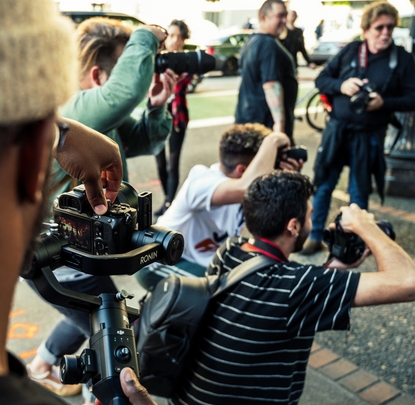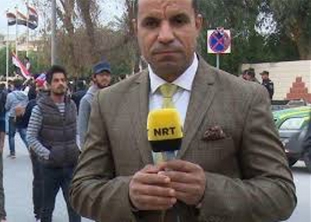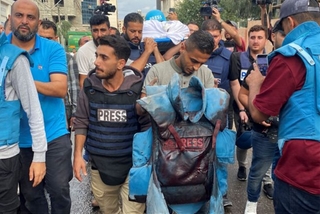International day to End Impunity for Crimes against Journalists: 2nd November 2023
By Navya Srivastava / GICJ
Don’t shoot the messenger, they say? The antithesis of that is unfolding now, today, everyday. The UN Secretary General said, “There should be no room for misogyny and violence in journalism.” The unfortunate and rhetorical response to this quote would be that the situation we have today is the opposite of it all. There is violence, misogyny, discrimination, censorship, intimidation and a lot more. To hopefully amend this situation for a better and more democratic future, we have this day, more precisely the International Day to End Impunity for Crimes against Journalists every 2nd of November since 2013, started by the United Nations. This day should serve as a reminder to us all and to governments across nations, to remember, question and ensure the extinction of crimes and infringement of rights faced by journalists on a daily basis. So, the question to ask is - to what extent is the situation today, ending impunity for crimes against journalists? What does it even mean? Or rather, what does it mean for journalists, for democracy, for us all? The answer to all these questions raises even more questions due to the recent cases and statistics proving the harsh reality of having a voice in our world.
Nearly half of all journalists killed worldwide since 2000 have been killed in just seven countries at war: Iraq, Syria, Afghanistan, Somalia, Israel/Palestine and Yemen.
Iraq:
|
Ahmed Abdulsamad, killed in Basra, south of Iraq, 10 0f January 2020. |
Iraq is one of the deadliest country in the world for journalists. Since the US invasion of 2003, at least 282 journalists have been killed and a further 74 journalists and media assistants have been abducted, with most of them killed as well. Alarmingly, the vast majority of these deaths were deliberate. On the 10th of January 2020, Iraqi broadcaster Ahmad Abdelsamad and cameraman Safaa Ghali were fatally shot while covering demonstrations in the south-eastern city of Basra. Less than two weeks later, photojournalist Youssef Sattar was also killed while covering demonstrations in Baghdad. In the following months, these killings have continued. Those who have not fallen victim to fatal attacks are often threatened with assassination or have been given prison sentences.
State of Palestine
|
The jacket of Palestinian journalist Muhammad Sobh, who was killed in an Israeli raid with a number of journalists while they were in front of a building in a hospital in Gaza City. (photo: BBC Arabic) |
Since 07 October 2023, more than 30 journalists have been killed. At least twelve of these deaths were reporters who were killed in connection with their work in the first two weeks, ten of them by Israeli bombardments in the Gaza Strip. The situation for journalists and media personnel grows more precarious as they are equally trapped in a 40-kilometre-long open-air prison where shellings continue to rain down. According to Reporters without Borders, some journalists, such as Palestine Today director Mohammad Baalouche and photojournalist Rushdi Sarraj, have even been killed in targeted attacks. Figures compiled by Reporters Without Borders (RSF) show the unprecedented scale of the tragedy for journalism in Gaza. Attacks on journalists have persisted even before the 07 October attacks. Al Jazeera’s Shireen Abu Akleh, a Palestinian-American journalist was killed in May of 2022 while reporting on an Israeli raid in the West Bank. Her 25-year-long career was violently cut short when she was shot in the head. Despite wearing protective gear and a vest which clearly indicated ‘PRESS’, independent investigations concluded that she was shot by an IDF solider though no disciplinary actions were taken. At Abu Akleh’s funeral, Israeli police intervened to prevent the funeral processions. Many others have been exiled.
Latin America
Taking a macro region/country-based perspective, Latin America and the Caribbean still prove to be regions with the highest number of cases of violence against journalists according to the 2022 UNESCO Director General’s Report on the Safety of Journalists and the Danger of Impunity. Furthermore, figures in a UNESCO brief indicate that this year, till July at least, 69 journalists had been killed in Latin America and the Caribbean from 10 countries alone. This brief also showcased the reality of women in journalism, where they constitute 29% of the total number of attacked journalists during elections adding to the fact that about 73% of women in this field surveyed to have been threatened, intimidated and insulted online with regard to their work and career. To augment the figures further, more than 1600 journalists have been killed for reporting news and informing the public, at least since 1993. This impunity has exacerbated the level of safety and security the journalists should ideally possess.
Saudi Arabia & the Rest of the World
One of the most internationally talked about and unfortunately relevant cases for this topic is the assassination of Saudi journalist, Jamal Khashoggi in 2018 which symbolises the grave risks faced by journalists and those who voice their opinions against positions of power. From this case to the Daphne Caruana Galizia case (Malta) in 2017 to Politkovskaya (2006) to Gauri Lankesh in India (2017), there is a direct link connecting all of these, that they are journalists seeking the truth and each act of violence against every journalist exacerbates the situation tenfold.
Journalism Going Forward
This 2nd of November marks the yet again efforts to combat this situation, globally with the help of the public, governments, and international organisations. Past efforts include the present number of over 26 resolutions adopted by the UN General Assembly, UNESCO General Conference and Human Rights Council since the adoption of the UN Plan of Action on the Safety of Journalists and the Issue of Impunity in 2012. Even the UNESCO Addis Ababa Declaration, as a result of 2019 Global Celebration of the World Press Freedom Day with the theme of Journalism and Elections in times of disinformation emphasised the public right to information, expansion of literacy, ensuring journalists’ safety with exceptional attention given to women journalists etc - have been significant to addressing the current challenges posed. Irrespective of all of these mechanisms and resolutions, the majority of people in the journalistic field still work under constant threat, exposing corruption, human rights abuses and wrongdoings while being exposed to the same.
This day works to end this constant feeling of threat, to raise awareness and mobilise support for their safety and protection worldwide. This culture of impunity perpetuates cycles of violence and human rights violations, suppressing the freedom of the press while ultimately undermining one's fundamental rights of expression. It’s not only imperative, but also cathartic to break this cycle, and collective effort by governments, media organisations and civil society is essential to realise this goal. Even more so, raising awareness of the jeopardising culture of press freedom is needed especially because press freedom is a cornerstone of democracy holds powers to account, gives the power back to the people just like it is supposed to be, and ensures essential checks and balances on authority in nations.
This day is a call to action to promote a safer and more informed democratic world by letting journalists do their work with the passion and sense of justice they always hold. Journalism is a vital pillar of democracy in our society and protecting the whistleblowers is needed to prevent false, self-censored or biased forms of reporting and protect editorial independence.
This year, let us renew this commitment to press freedom and ensure that those who seek their silence, the silence of truth and of what is right are held accountable while uplifting and upholding the invaluable role journalists and journalism in general play in our society.
Geneva International Centre for Justice (GICJ) believes in the protection of free speech, of democratic values and thus of journalists from impunity. This 2nd of November should mark as a date of remembrance for the ones we have lost in this battle for democracy and the ones we should all fight for.
________________________________________
#InternationalDay #UN #Journalism #Voice #News #Justice #GenevaInternationalCentreForJustice #GICJ









